Do your eyes look to the skies every time you hear an airplane?
What would you say if that aircraft was a business jet and you learned that each year, its operation in Canada supported 15 jobs, $1.27 million in wages, $1.92 million in GDP, and $4.16 million in economic output?
Of the 15 jobs supported by that jet annually, it’s likely that only three to five of them belong to pilots. In fact, there is so much more to the aviation industry than meets the eye! From aircraft maintenance engineers who ensure flight safety, to flight operations specialists who attend to a trip’s every detail, to client service professionals who take pride in building one-of-a-kind experiences, there are many private aviation careers you’ve probably never considered. Best of all, many of these opportunities do not require prior aviation experience—if you have great customer service skills and a passion for helping others, you can learn the rest!
Here, we go behind the scenes with AirSprint Private Aviation, the largest private aviation operator in Canada, to learn about some of the exciting career opportunities beyond the cockpit.
Sit back, relax, and get ready for professional inspiration.

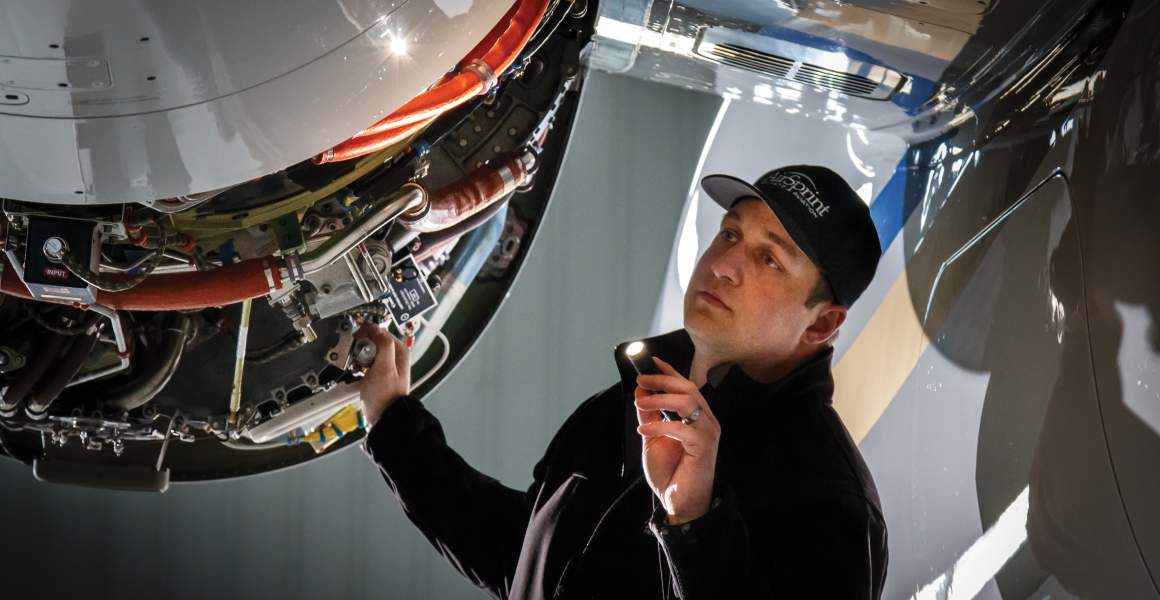

Where You’ll Work
Introducing AirSprint
Founded in Calgary in 2000, AirSprint Private Aviation has grown to be the biggest private aviation operator in Canada, serving Fractional Owners from coast-to-coast.
Fractional Ownership simply involves the purchase or lease of a share in a professionally-managed aircraft. Fractional Owners pay an Annual Overhead Fee covering things like pilot salaries and crew training, insurance, maintenance, hangar storage and administrative support. They are then charged a fixed hourly rate for the time spent on board. In return, they are allocated a set number of flight hours per year.
As of February 2025, AirSprint’s Fractional Ownership fleet totalled 40 private jets, including Embraer Praetor 500/600, Embraer Legacy 450/500, Cessna Citation CJ3+, and Cessna Citation CJ2+ models. The company earned its place in The Globe and Mail’s 2024 listing of Canada’s Top Growing Companies thanks to its recent three-year revenue growth of 141 per cent. More and more Fractional Owners are climbing on board, initially driven by the pandemic to explore a safer way to travel.
According to 2024 WINGX data, AirSprint flew nearly 30 per cent of all non-specialty Canadian registered business jet flights, excluding those performed by aircraft manufacturers and medevac flights.
AirSprint is wholly committed to safety and has achieved the ARGUS Platinum Rating, a respected independent business aviation safety rating. In fact, safety is the first of AirSprint’s six core values—the other five are people, service, integrity, humility and community.
“Ultimately, these values came from our Fractional Owners,” said AirSprint President & CEO James Elian. “We laid out our values and what is important to us, and these things remain important today. Each one of these values is critical to our success, but safety is the number one priority—nothing is more important.”
AirSprint employs over 370 people across Canada, and it has career opportunities for everyone—in many cases, no prior aviation experience is required!
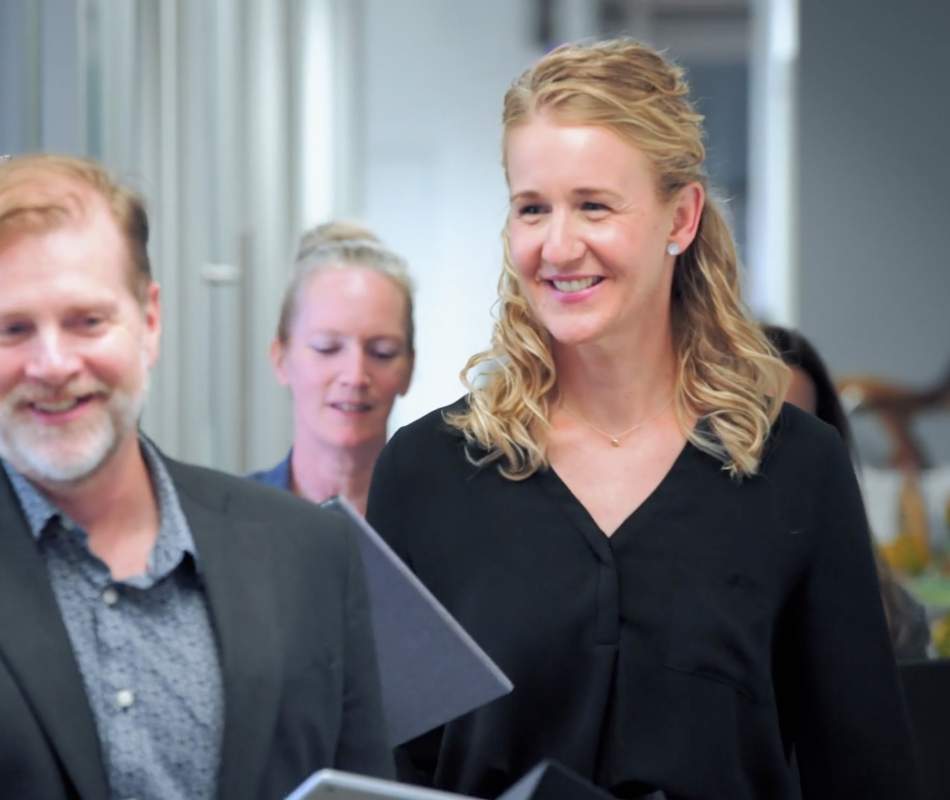
WHAT YOU'LL DO
Discover a Range of Exciting Aviation Careers
Let’s take a closer look at the people who make AirSprint exceptional. Meet some of our dedicated employees and learn more about their roles, day-to-day responsibilities, and what drives them to deliver outstanding service.
Aircraft Maintenance Engineer (AME)

AME David Doerksen and AME Apprentice Nicholas Eastman have been drawn to mechanical careers for as long as they can remember. Growing up on a farm, Eastman was used to working with his hands, but aviation is something different and exciting.
Doerksen and Eastman are based at AirSprint's main hangar, one of three locations in Calgary. Generally, they perform day-to-day line maintenance on the company’s fleet of 40 aircraft, including scheduled inspections as well as dealing with unexpected aircraft on ground (AOG) events.
“An AME and an AME Apprentice do basically the same work, but the AME has more responsibility because they must sign off on work performed to certify that it meets manufacturer standards and Transport Canada regulations,” explained Doerksen. Both he and Eastman attended the two-year AME program at the Southern Alberta Institute of Technology (SAIT) in Calgary.
“In school, you complete basic training requirements and the majority of the Transport Canada regulatory exams,” added Eastman. “An AME apprenticeship is 48 months long, but you get an 18-month credit for going to school—as long as you maintain a mark of 70 per cent or more in all your courses and meet the attendance requirements. After school, you apprentice for 30 months before you can become an AME.”
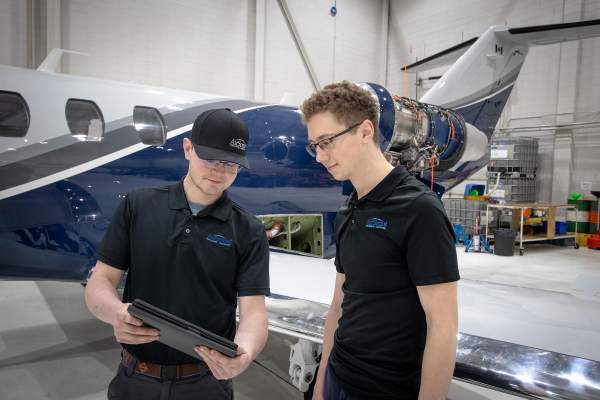
Nicholas Eastman (left) and David Doerksen (right) at main hangar.
When Doerksen finished his program, companies were just starting to ramp up following the Covid-19 pandemic. The shutdown had prompted some older AMEs to retire and there was lots of opportunity. He recalled how he finished school on a Friday and started at AirSprint the following Monday.
Work opportunities are still good today and AMEs are in demand, added Eastman.
What was it like coming to AirSprint? Thanks to the company’s detailed training program, both Doerksen and Eastman said they felt comfortable immediately.
“You get hired and go through an onboarding process to get familiar with company values and specific company processes,” said Eastman. “For maintenance, you have a bunch of different training. On the technical side, you do online courses to get familiar with aircraft manuals. But you can also ask anybody on the floor and they are happy to help you out. AMEs are willing to take you under their wing and show you the ropes and mentor you.”
It's not uncommon for AirSprint’s AMEs and apprentices to travel now and then. From their bases in Calgary and Toronto, they sometimes find themselves going on the road for training, or to assist with an AOG event. AirSprint also operates approved satellite maintenance bases in Kelowna, Saskatoon and Ottawa.
Doerksen said he’s travelled about 24 times over the past year, to Canadian destinations like Saskatoon, Dawson Creek, Fort St. John and Vancouver, and further afield to Hawaii, Las Vegas and St. Louis. Sometimes, he goes along with the pilots for a local maintenance test flight.
AirSprint’s incredible growth has created a lot of opportunities for advancement, said Doerksen.
“After you are a licensed AME, you can branch out to different areas of the department, including AME Lead positions, Maintenance Control and Quality Assurance,” he said. “As we grow, we’ll need more Base Managers. I got hired when we had 16 jets and we have 40 now.”
AirSprint’s maintenance professionals work 12-hour shifts on a rotating five on/four off, five on/five off, and four on/five off basis.
“Unlike a lot of aviation companies, we don’t do a true night shift,” Doerksen continued. “There is no one working between midnight and 5 a.m. Our shifts are 5 a.m. to 5 p.m., and 12 p.m. to midnight, with around eight people to a crew.”
Work-life balance is good: Doerksen said he can book any day off and it will be approved unless there is no other licensed AME on the floor. Plus, employees start out with two weeks of paid time off, inclusive of vacation and float leave (for scheduled employees), during the first three years of employment. This increases to three weeks starting in the fourth year and four weeks after completing 10 years of service. In addition, employees are entitled to other types of paid time off, including personal, flex, and sick leave.
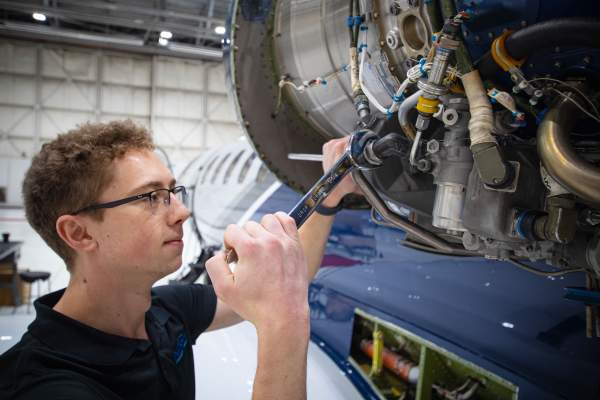
David Doerksen inspects the engine of a Cessna Citation CJ3+ with precision and expertise.
Both employees said technology is being leveraged in the hangar to streamline daily activities. For example, iPads make technical manuals more accessible and support the company’s ongoing transition to a paperless shop. Doerksen said the ability to plug into newer jets to access operational data assists with troubleshooting and leads to quicker resolutions.
With a positive company culture and management’s “open door” policy, Eastman said there are a lot of appealing aspects to an AirSprint career.
“You’re not working somewhere where people are miserable,” he concluded. “Everyone is willing to work with you. Our shift that we work is much more appealing than some of the aviation companies around here. And, I appreciate the emphasis on safety. Safety is number one for us. If we see anything that could be a hazard, we’re told to say something.”
The IOCC: What Is It and Who Works There?
At the heart of AirSprint is the Integrated Operations Control Centre, or IOCC. Functioning as the company nerve centre, the IOCC includes two divisions—Owner Services and Operations Control—who work together to ensure that each flight is planned and executed to perfection.
Working under the Director of Owner Experience (DOE), the Owner Services team includes two managers who oversee the delivery of Owner Services and Training & Quality Assurance, as well as Personal Flight Concierges (PFCs), booking, scheduling and communications staff.
Operations Control is headed by the Director of Operations Control (DOC), whose team includes operations and standards managers, team leads, Duty Managers, Flight Supporters, Flight Followers and Travel Coordinators.
All together, AirSprint’s IOCC is home to around 75 employees, all dedicated to ensuring an exceptional Owner experience. Read on as several IOCC employees describe their roles, responsibilities and rewards. First, we highlight jobs on the Owner Services side of the IOCC, followed by positions in Operations Control.
OWNER SERVICES TEAM
Owner Services Manager (OSM)

As AirSprint’s Owner Services Manager, People & Performance, Celia Sanchez has enjoyed the opportunity to refine a role that unexpectedly became available during the pandemic. She joined the company as a Personal Flight Concierge (PFC) in 2019, before moving into the Owner Services Manager position in 2020.
“Right now, I am the talent seeker for the PFC team. I build a strong team and manage different roles with strong performance goals,” she said. “The job was new when I started and was not clearly defined. I thought I understood the needs of the Fractional Owners and what type of talent was needed to hit targets and be a strong and efficient department. I was able to bring some suggestions and AirSprint listened.”
Born in France, Sanchez completed a course in tourism sales and production and moved to Québec City, picking up a job as a customer service agent with Air Transat.
“That job was so interesting; I loved it. I acquired more skills, like putting the bridge on the aircraft, and I was talking to the pilots and working with the passengers.”
She also worked as a travel agent, but felt the job was too focused on the sales side of the business when she preferred servicing the clients.

Celia Sanchez (left) with Alex Auffray (right) review the daily flight schedule.
“Then, I saw the PFC ad and realized it was right in the heart of the operation but on the client-facing side—so servicing without the sales target.”
After being promoted to her current role, Sanchez led a restructuring that created different positions to help diffuse the pandemic-driven uptick in business. “We created specialized roles that would take some responsibilities off the shoulders of the PFCs so they could concentrate on Owner services, and different layers for people to have something to work towards.” With her colleagues, she was involved in implementing Supervisor and Team Lead roles, and a Manager of Training & Quality Assurance—“so we have a manager of people and a manager of the processes.”
Sanchez is all about providing the appropriate training and tools to help her 32-member team succeed and grow at AirSprint, including transitioning to roles with more responsibility. She looks for personable team members with superb customer service experience and computer skills. All of the aviation material can be learned on the job, she said.
In 2022, the department switched to a new flight booking software that has vastly improved the Owner experience and streamlined employee processes. PFCs also use an AI-assisted email program to help them draft Owner correspondence, and new team members are now undergoing more online training.
“Compared to similar customer service roles in the travel and tourism industry, AirSprint PFCs are empowered to be creative when our Owners are facing complications, tricky situations, or simply when they want to celebrate special events like birthdays, anniversaries or important milestones,” continued Sanchez. “While some budgeting may need to be approved by management, depending on the circumstances, we feel empowered to advocate for our Owners. We are encouraged to think outside of the box and go above and beyond, with the flexibility of an industry and a business model that allows us to move mountains."
“All we are here to do is ensure they have a great experience. The job is different and exciting every day.”
Personal Flight Concierge (PFC)

When one of AirSprint’s Fractional Owners wants to book a flight, they have a single point of contact—their Personal Flight Concierge (PFC). Owners are paired with a primary PFC and one alternate, who function like account managers to ensure the Owner’s needs are met.
“You deal with their trips and any special requests like catering and ground transportation—basically, you cater to their expectations,” said Audrey Dufour, a PFC who currently manages 42 Owner accounts. “You get to know your accounts and Owners pretty well; you get to establish good relationships. So, when they call you, you know what they need.”
Dufour and her PFC colleagues Alex Auffray and Rebeca Bucsan followed different paths to the role, but one thing they all have in common is a desire to deliver highly personalized service.
While Dufour had a background as a flight attendant and airline customer service representative, Auffray followed up a tourism education with hotel industry experience before landing in his PFC role at AirSprint. Bucsan came to Canada to study English and, while at school, met a friend whose stepfather ran a fixed base operation (FBO) servicing private jets.

Collaboration in action—our AirSprint team comes together across departments to share ideas.
“I had no prior exposure to aviation, but I was so excited,” recalled Bucsan. “I was fascinated by how intricate the operations were and how so many roles existed. There are many jobs behind the scenes at an FBO.”
Dufour said commercial airlines have changed over the years, and she was attracted to the idea of delivering personalized service as a PFC.
Added Auffray: “I was always interested in the luxury industry and worked in five-star hotels. The private jet industry is the top level.”
Customer service skills are the key component of a PFC’s toolbox. As the first contact between an AirSprint Fractional Owner and the company, PFCs serve a crucial role.
“If that first contact is not well made, it will have a huge impact on the Owner’s satisfaction,” pointed out Auffray.
Dufour added that the PFC is the Owner’s advocate. “There could be scheduling conflicts or other issues that come up, so we advocate on behalf of our Owners in those cases. We always try to find a solution that meets their expectations and their needs.”
The trio of PFCs said that if they were hiring for their own positions, they’d look for someone with prior hospitality experience, especially with high-end customers. Communication and time management are important, along with patience and teamwork, since PFCs must coordinate with other departments at AirSprint. In a busy work environment, PFCs must be able to work confidently—whether on the phone or online—to ensure their Owners’ needs are met and their expectations surpassed.
PFC training takes a month, with candidates first learning about AirSprint’s structure and the various departments within the organization. From there, Fractional Ownership is explained in some detail before new employees begin learning about their own jobs.
“There’s a lot of shadowing,” said Dufour. “And once you get on the floor, it doesn’t stop there. You always have a lead or senior agent sitting next to you.”
Auffray appreciates that even after a month, AirSprint realizes that PFCs need continued support. “After maybe six months you understand the intricacies, but on the job training continues. Management does not pressure you.”

Reviewing the final details—ensuring every flight is personalized to the Owner's preferences.
PFCs, similar to other IOCC team members, have a chance for internal promotions. They could take on roles such as Team Leader or Audit Administrator—the latter position involves checking each flight to ensure everything is correct.
“There are opportunities to grow,” said Bucsan. “In the last year, I’ve seen many colleagues progress within the company.”
Other benefits of working at AirSprint include the ability to take advantage of the AirSprint GO program, which allows all employees and their friends and family to travel on company repositioning flights—for free! Qualifying flights are often referred to as “empty legs,” which are simply flights that are scheduled without any passengers on board. This unique perk gives all AirSprint employees the chance to create unforgettable memories as they experience the magic of private aviation firsthand.
Speaking of her PFC career, Dufour admitted that shifts are long, 12 hours with a one-hour break. “If you’re looking for a Monday to Friday 9-5 job, it’s not that easy to find in this industry, which is something to be aware of,” she said.
However, PFCs have all the tools and support they need, including customized software programs to help them build out a flight.
Auffray said aviation can seem a bit intimidating, but people should not be afraid. “It takes a bit of courage to start something new, but you will be trained and you’ll have all the tools you need.”
All three PFCs said they’d recommend an AirSprint career to friends and family because the culture is very good. Whether it’s company-wide wing nights, holiday parties, or the AirSprint hockey team, it’s all designed to keep communication flowing between departments.
“I’ve seen how dedication is appreciated,” concluded Bucsan. “It’s nice to see a company giving back to its employees.”
OPERATIONS CONTROL TEAM
Duty Manager & Flight Support Lead

Have you ever wondered who arranges for an aircraft to be fuelled, hangared or serviced at each destination? Who coordinates ground transportation and hotel accommodations for the pilots after a long day in the cockpit?
At AirSprint, it’s the Flight Operations team that takes care of every last detail to support the aircraft and the crew.
“We are the primary contact if the crew experiences any challenges,” explained John Akindulureni, Flight Support Lead at AirSprint. “Flight Supporters take care of the logistics for every flight, including fuel, customs, arranging for special services like ground transportation, crew meals and deicing. Before, during and after a flight, we keep in touch with the crew and provide oversight to the team that does all of our pre-flight planning.”
Duty Manager Jessica Brown said the Flight Operations team also creates the schedule to ensure pilots are available for every flight.
“We make sure it all works together, taking into account crew duty times and aircraft availability,” she said.
As a child, Brown wanted to be a pilot. As an adult, she realized that wasn’t the lifestyle she wanted – so she branched into other commercial aviation roles. A friend who worked at AirSprint described the company and Brown was intrigued enough to apply in late 2021—since then, she’s worked her way up from Flight Support to Duty Manager.
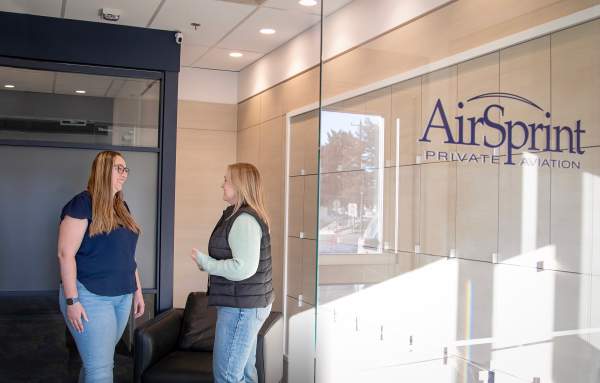
Madison Sabiston (left) and Jessica Brown (right) at the Integrated Operations Control Centre (IOCC).
Akindulureni began his aviation career as a commercial airline flight dispatcher in Africa. Before taking that position, he’d only ever thought of pilots, flight attendants and maintenance engineers when considering aviation careers. After moving to Canada, he came across the AirSprint website and said it felt like an opportunity to discover private aviation.
“I was very shocked because in commercial aviation, passengers pay and the airline calls the shots—but in private aviation, it’s the reverse,” said Akindulureni with a laugh. “Here, the air operator caters to the needs of the Fractional Owner.”
When an AirSprint Owner contacts their Personal Flight Concierge (PFC) to book a flight, the PFC puts together a package of requirements and sends it over to the Flight Operations team. From there, Duty Managers and Flight Support work on “the nitty gritty details” of the flight, from confirming a plane and crew, to booking aircraft departure slots, arranging for fuel, and preparing a trip sheet with all the info the crew will need. All AirSprint Fractional Owners have guaranteed access to an aircraft with as little as 24 hours’ notice, and there are many moving parts involved to ensure this guarantee is met.
Brown said trips can be a “constantly changing puzzle” when Owners revise their arrangements, and a Duty Manager’s first job is to make sure the flight can happen—where is the closest suitable plane with a crew available? Once that’s determined, it goes over to Akindulureni and his team members in Flight Support.
“We make sure the folks at the destination know they are coming and what is needed in terms of ground transportation, crew meals or accommodations,” said Akindulureni. He said his job demands someone who can think on their feet in a dynamic environment.

AirSprint offers a friendly, dynamic working environment and a competitive total compensation package.
“You must be able to solve problems in real time, be patient, and have the grit to remain on your toes during your 12-hour shift. Every little detail matters. For instance, if you miss something as small as getting the approval to arrive into a particular airport, that can derail the operation for the whole team. It’s challenging at the start, but there is lots of internal support and the only formal training required is a radio operator’s certificate.”
Duty Managers need many of the same qualities, said Brown. Patience and people skills are a must when collaborating with different internal teams. For her job, she got her flight dispatcher licence as well as completing weather and operational training. Most Duty Managers are promoted from the Flight Support team, and Brown said those who would like to move up in the company are encouraged to shadow others who are working the jobs they are interested in.
Flight Operations team members work 12-hour shifts—four days on, four days off. Akindulureni likes the schedule because you can project it well into the future and make plans accordingly.
“I love my job,” he said. “When I’m at work, I’m 100 per cent locked in, and when I’m away, I am 100 per cent locked off. The operations team is my Canadian family.”
Brown likes the schedule, too. “If you book a day off on either end, you get a chunk of time off for a little vacation. I also love my job, and working with the team makes this job what it is. It gets busy, sometimes frustrating, and tensions can be high—but we’re always a team.”
Both Akindulureni and Brown said they would encourage friends and family members to apply to AirSprint.
“There is room for them to start without investments in specialized education or a lot of training,” said Akindulureni. “You can start off a great career right away and there is room for promotion and making more money.”
Added Brown: “I know lots of people get into aviation thinking about travel. But going into it, I thought of front-facing customer service or being a pilot or flight attendant. To know there are other options is nice. An operational role made it a lot more attractive to me.”
Travel Coordinator

AirSprint has experienced incredible growth over the past few years, with several new roles created along the way. One of those is the Travel Coordinator position, now filled by previous Flight Support team member Madison Sabiston.
Sabiston’s specialty is moving people around and putting a roof over their heads—her job is all about booking positioning flights and hotels for travelling AirSprint employees.
“I handle all the arrangements for anyone at the company who needs to travel for company business,” she said. “That could be flights, hotel, rental cars, the train.”
On average, Sabiston books about 192 flights per month.
“My job is making sure the pilots can get to that flight assignment,” she explained. “I figure out the best possible way to get them there. We have pilots stationed from Halifax to Victoria.”
Since she was young, Sabiston said she’s been “into planes.” But when she got older, she pursued two veterinary certifications before realizing she wanted to make a change. From there, she found a job deicing planes for three seasons, enjoying the work and considering a future move to Nav Canada or the airlines.
A friend who worked at AirSprint reached out to her with an opportunity in Flight Support, and she jumped at the chance for secure, stable work with benefits.
Internal relationships are key in her position, noted Sabiston.
“I have good relationships with the pilots on the flight line. It’s about internal customer service, and this job needs someone who can think outside the box and is OK with change. That can be hard to find. As human beings, we all like a schedule and we all like things to go a certain way. With our job, it can go a certain way until it doesn’t. So flexibility is a must.”

Madison Sabiston specializes in logistics—coordinating positioning flights and accommodations.
As the first person in the Travel Coordinator role, Sabiston said she’s had the support she needed to develop her own procedures and processes.
“I think that being at AirSprint, there is a lot of opportunity for growth,” she said. “I think there is nowhere but up for AirSprint. A lot of the time, people think they have to buy the entire jet and pay for the crew; they don’t realize this company is out there.”
At the time of writing, Sabiston was training another Travel Coordinator and then they would both be working four days on, four off. She said she enjoys the schedule and the office atmosphere, where “we all seem to rally around each other.”
Aviation can be intimidating, she said. “For someone coming in without any aviation background, it can be scary. It’s a whole world you don’t know about. But AirSprint provides all the necessary training and tools to help you succeed, and from there you’re up and running.”
Ready to apply?
We're Ready When You Are
No matter which career you pursue at AirSprint, one thing is clear: You’ll never be flying without a wingman! For many roles, no prior aviation experience is required and the company prides itself on providing thorough on-the-job training that equips people to excel in their jobs.Whether it’s an AME Apprentice working under an experienced engineer, or a new Personal Flight Concierge shadowing their Team Leader, AirSprint’s company culture is helpful, inclusive and encouraging.
Want to learn more? Visit our Careers page.
Launch your future in private aviation—apply today.
© 2025 AirSprint Inc. All rights reserved. This paper was produced for AirSprint by Mustang Media Writing & Editorial Services
